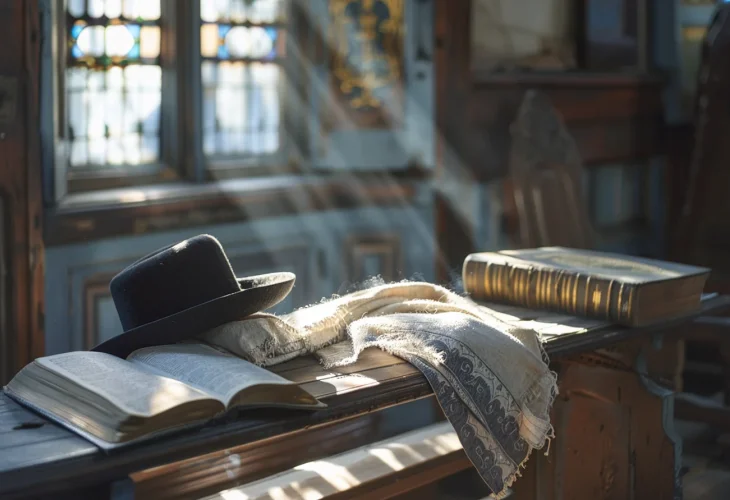Personal Stories
The Unwavering Spirit: Cantor Yossele Rosenblatt’s Sacred Stand
A voice the world admired but only the Jewish soul could truly understand

Cleofonte Campanini was stunned. “Nobody says no to me!” he repeated over and over, tugging at his beard in disbelief. “Anything can be bought with money,” he insisted.
Campanini was the manager of Chicago’s Grand Opera, one of the most respected cultural institutions in America during the 1930s. In 1931, he happened to attend a Jewish cantorial concert, and he was deeply moved by the voice and presence of one man: Cantor Yossele Rosenblatt.
Campanini immediately offered Yossele a contract for $17,000 which was a fortune at a time when most workers made about a dollar a week. The offer was for Yossele to sing in a Jewish-themed opera, performed only with Jewish artists and on Jewish topics, at the Chicago Opera House.
To Campanini’s shock, Yossele refused.
“I am a cantor in a synagogue,” he explained simply. “I lead the Jewish people in the sacred prayers of the High Holy Days. It is not respectful for me to appear in an opera house, which represents secular culture.”
Still determined, Campanini reached out to the leadership of the Great Synagogue of New York, where Yossele regularly served. He hoped they would convince him otherwise. But they agreed with Yossele that it wasn’t appropriate. The entire cultural world was taken aback. Why would anyone turn down such money, especially with all the conditions seemingly favorable?
But Yossele Rosenblatt was no ordinary singer. Unlike many cantors of his generation, he was deeply careful with both big and small matters in halacha (Jewish law) and in personal behavior. He saw his voice not as a career, but as a gift to serve Klal Yisrael, the Jewish people. He wasn’t an entertainer. He was a shaliach tzibbur, a representative of the community before Hashem.
Yossele was also known for his kindness and generosity. He often volunteered at charity events across the United States. At one such event on the West Coast, he faced unexpected travel difficulties. There was no transportation available. Rather than cancel, he chartered an entire train, saying, “Millions of charity dollars depend on this.” His dedication touched everyone and the event raised a staggering sum.
Soon after, Warner Brothers approached him with another tempting offer: to star in one of the first “talkies” films with a cantor who becomes a jazz singer and later returns to his roots. Again, Yossele refused. “A cantor who prays sacred tefillot (prayers) is not an actor in a movie,” he said.
However, due to growing financial pressure mostly because of his generosity to others, he agreed to record cantorial pieces to be used in the film’s soundtrack, without appearing on screen.
While in Hollywood for the recording, he met the legendary actor Charlie Chaplin. Chaplin shared something personal: “Whenever I feel sad, I listen to your cantorial recordings. They lift my soul.”
Yossele’s voice had that kind of power. He recorded over 600 cantorial pieces, many of which are still widely distributed and treasured to this day. His singing was not just musical, it was tefillah, filled with depth, warmth, and longing.
In 1933, Yossele was invited to visit the Land of Israel. He had never been before, and his heart longed to walk its holy soil. He accepted with deep joy. Everywhere he went, crowds gathered to honor him. On the first night of Pesach, he led prayers at the Ohel Shem hall in Tel Aviv. On the seventh day of Pesach, he was in Jerusalem, singing at a tish (Hasidic gathering) with the Sdeger Rebbe.
After the holiday, he began touring historic Jewish sites. On Lag BaOmer, he performed in Meron. Two weeks later, he visited the Jordan River and sang the haunting melody, “The Jordan Turned Back.” In the month of Sivan, he traveled south. At Rachel’s Tomb, he sang his famous piece “A Voice Is Heard on High.” The moment was emotional and unforgettable.
But the intense heat and travel took a toll on his health. Pushed from place to place to film and record more songs, he grew physically weak. His body, unused to the Israeli climate, struggled. While filming by the Dead Sea, a blood vessel burst in his head. He collapsed and passed away soon after at just 51 years old.
The Jewish world was shocked and heartbroken. In Jerusalem, a general work stoppage was declared. Thousands followed his aron (coffin) to Har HaZeitim (the Mount of Olives). Rav Avraham Yitzchak HaKohen Kook, the Chief Rabbi of Israel, eulogized him with deep sorrow: “My lyre and peaceful music have become a mourner’s lament.”
Cantor Yossele Rosenblatt left behind more than melodies. He left us an example of how to live with integrity, to honor Torah and tefillah, and to remember that spiritual greatness means knowing when to say “no” even when the world is applauding.

